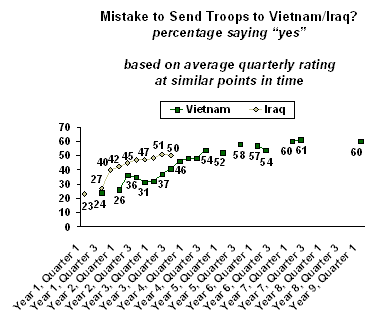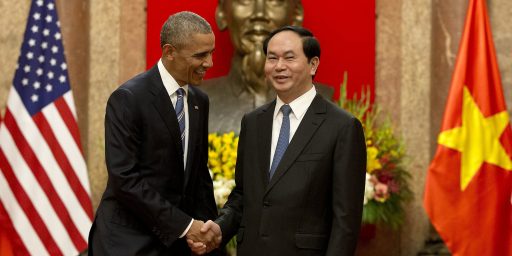Iraq Versus Vietnam: A Comparison of Public Opinion
Frank Newport and Joseph Carroll of the Gallup Poll provide a fascinating comparative analysis of the polling on the Vietnam and Iraq Wars. It is useful in the context of so many mis-comparisons of the two conflicts.
Iraq Versus Vietnam: A Comparison of Public Opinion
One of Gallup’s key measures used to assess public support for both the Vietnam War and the current war in Iraq asks Americans whether or not it was a “mistake” to send troops to those countries. The data trends for both wars (that is, every time the question was asked about Vietnam and every time it has been asked about Iraq to date) are presented in the accompanying graphs.
In order to provide a comparative basis between the two wars, the results have been aggregated into quarterly averages and the trend lines have been plotted, based on the first quarter of the year in which each war began in earnest — 1965 for Vietnam and 2003 for Iraq. Gallup first asked the “mistake” question about the Vietnam War in August 1965 (the third quarter of the first year of the war) and about the Iraq war in March 2003 (the first quarter of the first year of the war).
As the graph illustrates, Americans have become negative about the war in Iraq more quickly than they did for the Vietnam War.
The latest quarterly average for Iraq shows that 50% say it was a mistake to send troops (the most recent single measure on this indicator, from an Aug. 5-7 Gallup Poll, shows 54% saying the war was a mistake).
In the comparable quarter for the Vietnam War (the third quarter of the war’s third year — that is, the third quarter of 1967), Gallup found 41% saying the conflict was a mistake. It was not until the third quarter of the fourth year of the Vietnam War (August-September 1968) that a majority of Americans said the war was a mistake. In short, it took longer for a majority of Americans to view the Vietnam War as a mistake than has been the case for Iraq.
(There is one caveat in these comparisons: A larger percentage of Americans in the Vietnam years said they did not have an opinion about Vietnam than has been the case for Iraq.)
When the war in Iraq started in March 2003, only 23% of adults nationwide said it was a mistake to send troops to Iraq, while three-quarters said it was not a mistake. The percentage of Americans saying it was a mistake gradually increased, and by the end of 2003, it reached the 40% range. By June 2004, just one year and three months after the war began, a majority of Americans reached the conclusion that the war was a mistake.
Since that time, there have been significant fluctuations in the public’s responses to this question — usually in reaction to events relating to Iraq.
About six months after Johnson began large-scale U.S. involvement in Vietnam in 1965, Gallup found just 24% of Americans saying it was a mistake to send troops, while 60% said it was not. At least a plurality of all Americans continued to say it was not a mistake until July 1967, almost two and a half years after the United States had increased its military presence in Vietnam. In that July poll, a plurality still supported the notion that it was not a mistake to send troops to Vietnam, by a 48% to 41% margin.
[graphic omitted]
The tide began to turn by October 1967, when more Americans said it was a mistake to send troops to Vietnam (47%) than said it was not (44%). For nearly a year, this pattern persisted.
Finally, in an August 1968 poll, Gallup found for the first time that a majority of Americans, 53%, said it was a mistake to send troops to Vietnam. This was three and a half years into the war.
(Opposition to the Vietnam War, as measured by this “mistake” question, continued to grow, as the percentage of Americans who said it was a mistake averaged 55% in 1969 and 1970, then increased to 60% in 1971 and 1973. When asked this question in retrospect, Americans have continued to say they feel it was a mistake to send troops to Vietnam. Most recently, three polls conducted from 1990 to 2000 found about 7 in 10 Americans saying it was a mistake.)
It should be noted, of course, that Vietnam itself changed the climate of public opinion, perhaps permanently. As a result of Vietnam, Watergate, and changes in the media climate, Americans are much less trusting of their government than they were in 1965. The public quickly sours on even relatively small-cost wars like Somalia when they see televised images of American casualties.
This isn’t blaming the press; merely noting the effects of 24/7/365 coverage of the cable news and Internet era, combined with the “gotcha” mentality of the post-Watergate era. It is hardly an original thought, but one wonders whether Americans would have sustained support for World War II in the current media climate.






Just goes to show the effectiveness of the MSM in assiting the enemy. What poll number do we need to give Sheehan what she wants, and render the whole damn thing pointless.
What about a poll question about how many people think the U.N. is full of spineless jellyfish, solely concerned with their own (or their country’s) econimic wellfare?
One additional, however obvious point:
In foreign policy, you don’t get to change your mind after the fact. 54% saying it was a mistake now does not supercede the 24% before. So what does it matter?
Let’s talk about how many congressmen voted for the war, and are now backtracking.
I know, I know, the Evil Bush lied to us, and them. Still haven’t seen any convincing proof.
No, no one wonders because, and this is the important bit, direct U.S. involvment in WWII started when she was attacked by Japan.
Iraq did not, could not and would not attack the U.S. This is way the Bush Administration pushed the WMD angle so hard, they knew that the only reasonable reason for the invasion would be self-defense . We of course now know that was at best a grotesque intelligence debacle that should have resulted in the firing of half of the U.S. espionage community (instead they got medals!) and at worst a cynical lie that a quick and easy war would have paved right over.
Now that the pipe dream of a quick and easy war has gone up in smoke the public is rightfully annoyed.
We had a pro-American press during WWII. Now we have a traitorous anti-American press. If a Democrat wins in 2008 Texas could secede from the union and the high potential casualty rate would mean that the Democrats would let them do it. As a matter of fact, that might be a good idea. Then Texans could give the traitors their just deserts.
“No, no one wonders because, and this is the important bit, direct U.S. involvment in WWII started when she was attacked by Japan.”
And what was the first country we went into in WWII? Hint: Not Japan.
funny enough…the first country we invaded in WWII was neutral Vichy Alegeria…where i believe we killed some 3000 french….but thats history…
to the present day…i’m actually amazed that poll numbers aren’t worse than they are…think about it….2 1/2 years of negatively portrayed news coming from the MSM day in and day out…i’m suprised support for the war hasen’t dropped to 10%
If you do a trend line for the Vietnam War of the number opposed it would show that the Tet offensive essentially had no more impact then anything else since the trend was growing at about the same rate before and after Tet.
In other words there was no break in trend around Tet.If that is true how could the MSM misreporting the results of Tet cause the US
to lose?
For the sake of historical accuracy, the US only entered World War II after Pearl Harbor, at which point the UK had already been at war with Nazi Germany for two years….We declared war on Japan in response to a direct attack on the US — by Japan. Then Germany, which had entered into an alliance with Japan and Italy, declared war on the US.
In the case of Iraq, that country had (a) never attacked us (b) never threatened to attack us (c) had no WMDs that were capable of threatening the US. In fact Vietnam was probably more of a “threat” the US than Iraq was, after 10 years of an international embargo and two devastating wars before that. The American people are basically behaving quite rationally in their decision to turn against this fiasco.
There have been a number of major endeavors which have been suppressed and have instead been inter-preted as some kind of United States constituent foreign interest.
The first involves SUNY, as a site affected with music publishing malfeasance along with the nation as a whole, and the necessity to spectro-graph all recorded music so as to enforce truth- in-advertising and racketeering laws in the enter-tainment industry. [War in Iraq]
The second involves the effort, originally envisioned as public ATM links, to route accurate and timely information about major ethics imbroglios directly to federal agents without infecting the populace with unsavory information nor assisting malfeasants with the means to extricate themselves from a legally-scheduled courtroom hearing. [We now have money-dispenser ATMs instead, and the war in Afghanistan]
The third involves abatement and prosecution of telephone call-demand networks, whose parti-cipants elicit and extract words and phrases from respondents for their own use and further dissem-ination, often using uniformed roles to initimi-date and continuously interrogate respondents without relief. [The Persian Gulf war]
Another involves the engineering of a jar, bowl or other appropriate receptacle to contain, protect, and display a tiny archeological artifact which has been well protected beneath a limestone monument in a northeast United States cemetery. An oracle bead chronicle is composed from mucous forged in the nose and nasal cavities of its maker, and requires one-of-a-kind contain-ment. [Wars in Viet Nam and Laos]
An intent to identify and restore archeological sites in Europe, such as German castles and Greek temples, has been continuously sidelined by the efforts of the English to claim and settle in such fortresses…unless, of course, its their turn to have a ticket to some American region. [World War II]
My interpretation of these trends is that it’s becoming increasingly important to obtain precise and accurate assessments of the order of battle, and that the kind of inaccuracies promoted by “the press,” which is an inadequate Civilian Intelligence System, probably determines the trend. That is, the kind of things the press routinely leave out of their reports, not so much because of bias, but because their normal function isn’t war intelligence but reporting car accidents, robberies, and political horse races.
And the most sobering aspect of these numbers is that if we can’t figure a way to “fix” our Civilian Intelligence System, we might very well lose this war. And I don’t just mean the War in Iraq.
What we need are a dozen or two more Michael Yons, as well as some way to take the market share away from MSM, probably by forcing some comparative coverage of significant events in real time. The enemy, by this time, knows our “weakest link” pretty well, so maybe it’s time to show them the exit door?
James H.-
Your willingness to re-write history is truly astounding…
Although we did not enter WWII until Japan attacked, chronologically, it was a matter already under consideration.
But let me talk about something I know much more about.
First, Iraq DID attack us, repeatedly. The international community and the U.N. expected us to enforce the conditions of cease fire after Gulf War I. We all know they were constantly violated, from shooting at our jets, to oil for food, to Saddam murdering his own people. Just because he did not successfully shoot down one of our planes, does not remove it from being an “Act of war”. Perhaps it was the spineless U.N., and the countries implicated in illegal trade with Saddam that we should be at war with?
Second, the WMD “controversy”. How can we logically arrive at the conclusion that Iraq did not have WMD so easily, when every intelligence agency in the world knew he DID? Is 2.5 years enough time to have searched every possibilty? Or are we relying on the reports of folks like Blix who had something to gain from there not being any WMD? We all know Saddam was a master of camouflage and concealment. We all know that with Gulf War I, we essentially trained Saddam in how we would strike such targets. We all know that Saddam was violating U.N. sanctions and had an appetite for WMD. We all know that Saddam worked with is neighbors in Gulf I to protect his valuable military assets (of course we know Syria and Iran have no great love for the U.S., and in fact would prefer not to have a free republic as their neighbor). We should all know, as has been reported, that WMDs HAVE been found in Iraq. Perhaps not in quantities or of vintage to satisfy critics, however banned wepaons HAVE been found. (BTW how much and how recent is the material required to be to satisy?)
So, with all of this, we can now say, without doubt, by betting on the lives of our families, that there were NO WMDs? Sounds like an anti-war sound-byte to me. I really hope you’re right, too. Remeber, there was NO Al Qaeda there either. Seems like they are now. So let’s just leave and let them prosper.
Tracking an f-14 with an outdated SAM is hardly an attack and certainly not something to launch a war on. If the Japanese had flown over Pearl Harbor without dropping a bomb would that have been the start of WWII?
That is simply untrue at worst and hyperbole at best.
More than a single rusted out shell of 10 year old sarin, because that is all that has been found. (and it was the terrorists that found it, if they hadn’t used it as part of an IED it probably never would have been found, ironic huh?)
Thousands of Iraqis killed, thousands of coaltion forces killed, a new source of terrorist recruitment and training, billions spent all for a single, rusted out shell of sarin.
Yeah, good job Bush and Bush supporters, that shell was certainly a sword hanging over all our necks.
And. Bin Laden. Still. Alive.
Pah, justice is over rated, anyway he already pulled off the most deadly terrorist attack in history, what are the odds he’ll do it again?
Well, if Iraq becomes a failed state, thus fulfilling the next step in their “method of Muhamed” strategy, it’s about as close to 100% as it can get. Moreover, since both he and Zawahiri seem to have acquired an Iranian tailor, it might not be far from 100% now.